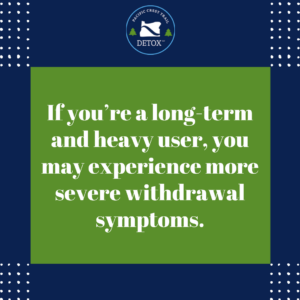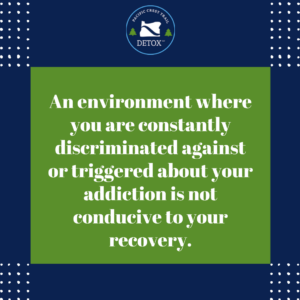Substance abuse recovery can be overwhelming, especially when you first hear about medical detox. You may think that it is only a period of withdrawal and is likely to be a terrible experience. However, medical detox is necessary to manage your withdrawal.
Without a doubt, this process is complex and multi-layered. It takes a while before you can appreciate its role in recovery. But if you’re ready to learn more about it and see if you can start, let’s dive in.

What Is Detox?
Medical detox, short for detoxification, is the first step in treating substance abuse disorder. Your body will be cleansed of toxic substances under professional supervision. During this time, your substance use will progressively decrease until there is none at all. As you can expect, this may cause some withdrawal symptoms.
Medical detox ensures that your physical withdrawal symptoms are managed. This often involves treatment plans that include medications to ease your symptoms, replace your fluids, and monitor any complications you may have.
Apart from the physical side of medical detox, it also prepares you for the next stages of recovery. You may find yourself participating in therapy and support systems that address the psychological aspects of your addiction.
When Do I Need A Medical Detox?
Recognizing when you need a medical detox is just as important as starting it. Here are some instances you can look out for:
High-Risk Substance Withdrawal
If you’re withdrawing from high-risk substances like alcohol, opioids, or benzodiazepines, medical detox is crucial. Remember that these substances can be life-threatening when you’re withdrawing from them incorrectly. Severe withdrawal symptoms that come with these substances are severe dehydration, seizures, and psychological symptoms like extreme confusion.
Severe Addiction
The severity of your addiction depends on the intensity and longevity of your substance abuse. If you’re a long-term and heavy user, you may experience more severe withdrawal symptoms. These symptoms will be both physically and emotionally challenging, some of them leading to severe chronic conditions. Compassionate detox care can minimize potential complications.
Co-occurring Medical Conditions
Existing health conditions often complicate withdrawal symptoms. Heart disease, diabetes, or respiratory problems can worsen during detox because your body is undergoing several stressors. A safe medical detox will ensure that you are under constant health monitoring to manage both your withdrawal symptoms and existing conditions.
Prior Withdrawal Complications
If you’ve previously attempted to quit substance abuse and experienced severe withdrawal symptoms, it may be a great idea to enter medical detox. Going under supervision can prevent recurring issues you may have experienced. This process is strongly advised if you have recurring seizures, hallucinations, or acute anxiety.
Mental Health Concerns
Substance abuse can be particularly challenging if you have co-occurring mental health conditions such as depression, anxiety, or bipolar disorder. These make detox challenging, as your body and hormones will undergo severe changes. Professional medical detox can provide you with additional psychiatric support to address both your mental and physical health.
Lack of A Safe Environment
An environment where you are constantly discriminated against or triggered about your addiction is not conducive to your recovery. In such cases, you may want to consider professional medical detox in Oregon. Without a supportive environment, the risk of relapsing will only increase. A medical detox facility will provide you with a space free of potential triggers and stressful situations.
The Medical Detox Process
To help ease your nerves about detox, here’s what you can expect during the process.
Initial Assessment
Medical detox begins with an initial assessment. This is a crucial step where medical professionals identify your needs and the treatment plans to address them. The initial assessment involves a detailed review of your drug or alcohol use, medical and psychological conditions, and any co-occurring disorders. While you may not want to tell someone about your substance abuse history, this step ensures that your treatment can be as safe and effective as possible.
Detoxification Phase
The detoxification phase will eliminate toxins that have accumulated in your body throughout your substance use. This ensures that your withdrawal is safe and won’t cause complications.
During this phase, you may also receive medications to manage any of the symptoms you may be experiencing. Some common medications include methadone, buprenorphine, and clonidine. These reduce cravings, ease withdrawal symptoms, and decrease your anxiety and muscle pain.
Alongside medication, you will also receive health assistance such as nutrition management and emotional support.
Transition To Ongoing Treatment
Remember that medical detox is the very first step of treatment. A safe and effective detox is crucial for long-term recovery. After this, you may undergo therapy, counseling, and support groups to prepare you for ongoing treatment. These can be physically and emotionally challenging, so you and your body must be prepared.
You may also discuss possible treatment plans with your medical professionals. This ensures that your transition is smooth and reduces hindrances to recovery.
In Conclusion
Recovering from substance abuse disorder often begins with a medical detox. And it’s just as important to know when to start. You may want to consider it if you have co-occurring physical and mental health conditions, or if you’ve tried to do it on your own but were unsuccessful. It may be scary and overwhelming, but take comfort in knowing that medical detox is programmed with a lot of medical supervision and care for your needs.
Whether you need a drug or alcohol detox, we can help. Contact us at Pacific Crest Trail Detox today!



